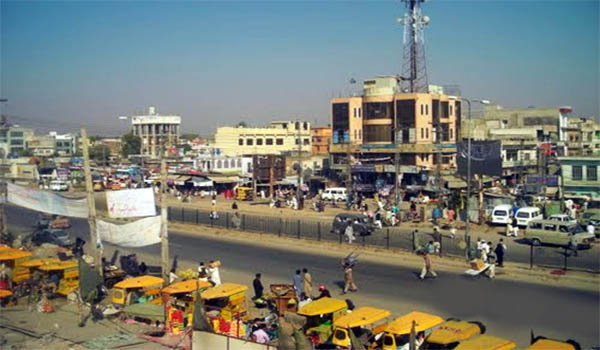
Gujar Khan is a city in Rawalpindi District in Punjab province, Pakistan. It is approximately 55 kilometres southeast of Islamabad, the capital of Pakistan and 220 km to the north west of Lahore, capital of Punjab. It is bounded on the north by Rawalpindi, Islamabad and Attock, on the south by Jhelum and Gujrat, on the east by Azad Kashmir and Kahuta and on the west by Chakwal and Khushab. Gujar Khan is also the headquarters of Gujar Khan Tehsil, and the largest tehsil of Punjab by land area.
Located in the heart of the Pothohar region, The city and surrounding region is renowned for its martial culture and is sometimes referred to as the 'Land of the Shaheeds', having produced two recipients of the Nishan-i-Haider.
The place was named after the Gujars, who were the rulers of the Gurjara-Pratihara Kingdom, ruling for centuries during the late classical period. In 997 CE, Sultan Mahmud Ghaznavi, took over the Ghaznavid dynasty empire established by his father, Sultan Sebuktegin. In 1005, he conquered the Shahis in Kabul in 1005, and followed it by the conquests of Punjab region. The Delhi Sultanate and later Mughal Empire ruled the region. The Punjab region became predominantly Muslim due to missionary Sufi saints whose dargahs dot the landscape of Punjab region.
The Mughal Empire later fell into a deep decline at which point the Sikh Empire invaded and occupied Rawalpindi District. The Muslims faced restrictions during the Sikh rule. Eventually the Sikh Empire collapsed and the British began direct rule in the region until 1947. During the period of British rule, Gujar Khan Tehsil increased in population and importance. After the independence of Pakistan in 1947, the minority Hindus and Sikhs migrated to India while the Muslims refugees from India settled down in the Rawalpindi District.
Tehsil of Gujar Khan was described in the Imperial Gazetteer of India, compiled during the first decade of the twentieth century, as follows:
Southern tehsil of Rawalpindi District, Punjab, lying between 33°4′ and 33°26′ N and 72°56′ and 73°37′ E., with an area of 567 square miles. It is bounded on the east by the Jhelum River, which cuts it off from Kashmir territory. Except for a low ridge of sandstone hills along the Jhelum, the tehsil consists of a plain intersected by numerous ravines. The population in 1901 was 150,566, compared with 152,455 in 1891. The land revenue and cesses in 1903-4 amounted to 2-7 lakhs.
In 1945, Maulana Amanat Ali became president of Pakistan Muslim League Gujar Khan and hosted Quaid-e-Azam Muhammad Ali Jinnah along with his sister Fatima Jinnah gathering in Gujar Khan in 1946. Gujar Khan also contained a notable Hindu and Sikh population, though much of this population either converted to Islam during British rule, or migrated to India following partition. However the area is still home to Hindu temples and Sikh Gurdwaras, which have been maintained through the years by residents of the area.
Gujar Khan Tehsil is one of the seven Tehsils (sub-divisions) of Rawalpindi District with headquarters in Gujar Khan City and is administratively subdivided into 36 Union Councils, whereas the city of Gujar Khan is administered by Municipal Committee. According to the 1998 census of Pakistan, the city had a population of 57,099.
Large reserves of oil and gas were discovered in February 2002 at Tobra, about ten kilometres from Gujar Khan. The field is being developed by the Oil and Gas Development Company. The field could produce 1,600 barrels of crude oil daily.
Before 1960, people of Gujar Khan Region were largely depended on agriculture. Small land holdings and economic conditions forced people to look for alternatives. From the early 1960s, many inhabitants started migrating to European countries; mainly to the United Kingdom, Greece, Holland, Denmark and Norway, to the Middle East in the 70s and later to USA, Spain and Italy from the 90s onward. This has brought about an improvement in the economic conditions for majority of the population with better living conditions for many in the villages.
Gujar Khan is situated on the Grand Trunk Road (GT Road) from Rawalpindi to Lahore. Railway Road links from the east of the city to the nearby towns of Bewal and Islampura. There are also many other minor roads linking the villages and towns of the region to the city.
Gujar khan railway station is located in the centre of the city and provides links to Rawalpindi, Jhelum, and Lahore.
Local services also provide extensive bus routes around the local towns, and smaller shuttles go around the villages in the surrounding area. There are also services to Rawalpindi, Islamabad, Jhelum, and Lahore. Local Auto-Rickshaw drivers also provide transport for people in and around the city.